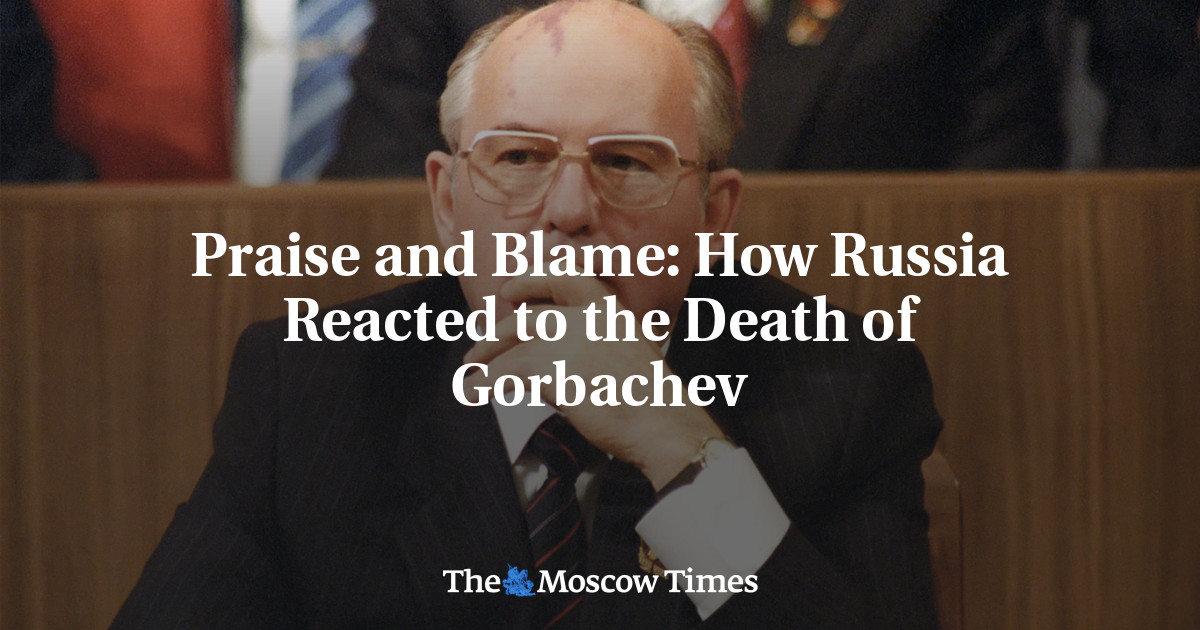
The death of the last Soviet leader Mikhail Gorbachev prompted differing reactions from Russians on Wednesday, with criticism expressed alongside tributes, reflecting the Nobel Prize-winning leader’s polarizing legacy in the country that he called home.
Many supporters of Russian President Vladimir Putin — who famously described the collapse of the Soviet Union overseen by Gorbachev as “the biggest geopolitical catastrophe of the century” — didn’t shy away from listing Gorbachev’s failures, while prominent opposition figures characterized the Soviet leader’s passing as a personal loss.
In a brief condolence letter Wednesday, Putin referred to Gorbachev as a “statesman who made an enormous impact on the trajectory of world history.”
“He headed the country at a time of difficult, dramatic changes,” said Putin. “He knew very well that reforms were necessary and looked to offer his own solutions.”
Others were open with their disdain for Gorbachev’s political legacy.
“As a Christian, I mourn… Just like I mourn the great country that was broken apart by processes of perestroika and the new thinking, which helped those who wanted to wipe the USSR from the political map of the world,” said State Duma deputy Leonid Slutsky.
Putin’s official spokesman Dmitry Peskov called Gorbachev’s death “a big loss for our country,” while also decrying the ex-leader’s alleged naivete vis-a-vis the West.
“There was no romantic period… The bloodthirstiness of our opponents was revealed. It’s a good thing we realized and understood it in time,” state-run Interfax quoted Peskov as saying in apparent reference to Russia’s justifications for its invasion of Ukraine.
The unfavorable view of Gorbachev’s legacy among many Russians is largely a result of the monumental changes that took place during his rule, according to historian Vladislav Zubok, author of “Collapse: The Fall of the Soviet Union.”
“When you live through that, you kind of have to blame somebody and people blame Gorbachev,” Zubok told The Moscow Times.
Unsurprisingly, the head of Russia’s Communist Party, Gennady Zyuganov, said Wednesday that Gorbachev was a leader whose rule brought “absolute sadness, misfortune and problems” for “all the peoples of our country,” state-run news agency TASS reported.
Russian Prime Minister Mikhail Mishustin was among those with a more favorable view of Gorbachev, saying in a statement that the ex-leader was a “brilliant statesman.”
Meanwhile, key voices of Russia’s opposition were largely united in mourning the loss of someone they saw as a liberal ally and a believer in democracy.
“We’ve all been orphaned. Just not everyone has realized it,” wrote the ex-editor-in-chief of Ekho Moskvy radio station Alexei Venediktov.
Exiled tycoon Mikhail Khodorkovsky said Gorbachev’s death was a “personal loss.”
And imprisoned opposition leader Alexei Navalny — who said he learned of Gorbachev’s passing from loudspeakers in his jail — described Gorbachev’s willingness to leave his post peacefully as “a great feat by the standards of the former USSR.”
“I am sure that his life and history, which were pivotal to the events of the late 20th century, will be evaluated far more favorably by posterity than by contemporaries,” Navalny said.
The Nobel-prize-winning editor-in-chief of independent Novaya Gazeta Dmitry Muratov wrote in an article Wednesday that Gorbachev gave Russians “thirty years of peace without a threat of a global nuclear war.”
“The man named Gorby no longer stands between the world and a nuclear explosion. Who could replace him? Who?” Muratov said.
Others remembered more specific achievements of the former leader, with Moscow’s former chief rabbi Pinchas Goldschmid, who left Russia due to his opposition to the invasion of Ukraine, praising Gorbachev for lifting travel restrictions on Soviet citizens.
“Three million Soviet Jews owe him their freedom,” Goldschmid tweeted.
The Kremlin is yet to make a decision on whether there will be a state funeral for Gorbachev, according to Putin’s spokesman Peskov, Interfax news agency reported.
“The procedure will depend on the wishes of relatives and loved ones. There is no information yet,” Peskov said.
But, according to unidentified sources quoted by Interfax earlier Wednesday, the last Soviet leader is unlikely to be buried with state honors.
If true, such a decision would be indicative of the Kremlin’s reluctance to memorialize past leaders of the country, and its ambiguous feelings for Gorbachev’s legacy.
“That’s outrageous… but I am not surprised,” said historian Zubok.
“There is no state called the Soviet Union anymore…so it would be sort of like having a state funeral for Emperor Franz Joseph in Austria-Hungary after it collapsed.”